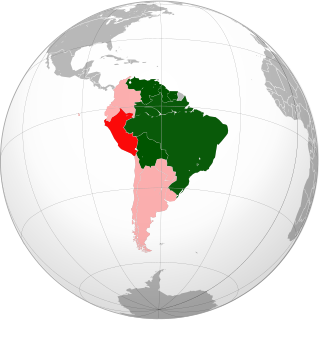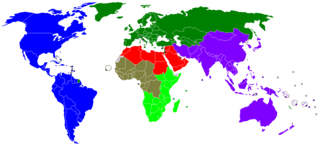 W
WThe member states of the African Union are the 55 sovereign states that have ratified or acceded to the Constitutive Act of the African Union to become member states to the African Union (AU). The AU was the successor to the Organisation of African Unity (OAU), and AU membership was open to all OAU member states.
 W
WBolivarian Alliance for the Americas (ALBA) has 10 member states and three observer states. In addition, Suriname is a "special guest member" which intends to become a full member.
 W
WThe Arab League has 22 member states. It was founded in Cairo in March 1945 with six members: the Kingdom of Egypt, Kingdom of Iraq, Lebanon, Saudi Arabia, Syrian Republic, and Transjordan. North Yemen joined on 5 May 1945. Membership increased during the second half of the 20th century. Six countries have observer status.
 W
WAs of 2010, the Association of Southeast Asian Nations (ASEAN) has 10 member states, one candidate member state, and one observer state.
 W
WA member state of the Caribbean Community is a state that has been specified as a member state within the Treaty of Chaguaramas or any other Caribbean state that is in the opinion of the Conference, able and willing to exercise the rights and assume the obligations of membership in accordance with article 29 of the Treaty of Chaguaramas. Member states are designated as either More economically developed country (MDCs) or Less economically developed countries (LDCs). These designations are not intended to create disparity among member states. The Community was established by mainly English-speaking Caribbean countries, but has since become a multilingual organisation in practice with the addition of Dutch-speaking Suriname in 1995 and French-speaking Haiti in 2002. There are fifteen full members of the Caribbean Community, four of which are founding members.
 W
WThere are six member states of the Cooperation Council for the Arab States of the Gulf (CCASG) or Gulf Cooperation Council (GCC).
 W
WThere are 9 member states of the Commonwealth of Independent States.
 W
WThe Commonwealth of Nations is a voluntary association of 54 sovereign states. Nearly all of them are former British colonies or dependencies of those colonies.
 W
WThe Council of Europe was founded on 5 May 1949 by ten western and northern European states, with Greece joining three months later, and Iceland, Turkey and West Germany joining the next year. It now has 47 member states, with Montenegro being the latest to join.
 W
WThe Dutch Language Union is an international regulatory institution that governs issues regarding the Dutch language. It is best known for its spelling reforms which are promulgated by member states, grammar books, the Green Booklet and its support of Dutch language courses and studies worldwide. It was founded on a treaty concluded between the Netherlands and Belgium on 9 September 1980. Suriname has been an associate member of the Taalunie since 2004.
 W
WThe European Union Aviation Safety Agency (EASA) is an agency of the European Union (EU) with responsibility for civil aviation safety. It carries out certification, regulation and standardisation and also performs investigation and monitoring. It collects and analyses safety data, drafts and advises on safety legislation and co-ordinates with similar organisations in other parts of the world.
 W
WThe European Union (EU) consists of 27 member states. Each member state is party to the founding treaties of the union and thereby shares in the privileges and obligations of membership. Unlike members of other international organisations, the member states of the EU have agreed by treaty to shared sovereignty through the institutions of the European Union in some aspects of government. Member states must agree unanimously for the EU to adopt some policies; for others, collective decision making is by qualified majority voting. Subsidiarity, meaning that decisions are taken collectively if and only if they cannot realistically be taken individually, is a founding principle of the EU.
 W
WThe eurozone, officially called the euro area, is a monetary union of 19 member states of the European Union (EU) that have adopted the euro (€) as their primary currency and sole legal tender. The monetary authority of the eurozone is the Eurosystem. Eight members of the European Union continue to use their own national currencies, although most of them will be obliged to adopt the euro in the future.
 W
WThis is a list of the member states of the Organisation internationale de la Francophonie. These countries belong to an international organisation representing countries and regions where French is the first ("mother") or customary language, where a significant proportion of the population are francophones or where there is a notable affiliation with French culture.
 W
WThe G20 developing nations is a bloc of developing nations established on 20 August 2003. Distinct and separate from the G20 major economies, the group emerged at the 5th Ministerial WTO conference, held in Cancún, Mexico, from 10 September to 14 September 2003. The group accounted for 60% of the world's population, 70% of its farmers and 26% of world’s agricultural exports.
 W
WThe G33 is a coalition of developing countries, established prior to the 2003 Cancun ministerial conference, that have coordinated during the Doha Round of World Trade Organization negotiations, specifically in regard to agriculture.
 W
WThe Organization of Ibero-American States has the below 23 member states:
 W
WThe member states of the International Atomic Energy Agency (IAEA) are those states which have joined the international organization that seeks to promote the peaceful use of nuclear energy, and to inhibit its use for any military purpose, including nuclear weapons. The IAEA was established as an autonomous organization on 29 July 1957. Though established independently of the United Nations through its own international treaty, the IAEA Statute, the IAEA reports to both the UN General Assembly and Security Council. During 1956, an IAEA Statute Conference was held to draft the founding documents for the IAEA, and the IAEA Statute was completed at a conference in 1957.
 W
WCurrently, Mercosur is composed of five full members, five associated countries and two observer countries:
 W
WNATO is an international alliance that consists of 30 member states from North America and Europe. It was established at the signing of the North Atlantic Treaty on 4 April 1949. Article Five of the treaty states that if an armed attack occurs against one of the member states, it shall be considered an attack against all members, and other members shall assist the attacked member, with armed forces if necessary.
 W
WParties to the Chemical Weapons Convention encompasses the states that have ratified or acceded to the Chemical Weapons Convention, a multilateral treaty outlawing the production, stockpiling, and use of chemical weapons. In addition, these states are members of the Organisation for the Prohibition of Chemical Weapons (OPCW).
 W
WThe Organisation of Islamic Cooperation founded in 1969 has 57 members, 56 of which are also member states of the United Nations with 42 countries being Muslim majority countries. Some, especially in West Africa, are – though with large Muslim populations – not necessarily Muslim majority countries. A few countries with significant Muslim populations, such as Russia and Thailand, sit as Observer States, while others, such as India and Ethiopia, are not members.
 W
WThe Organization of the Black Sea Economic Cooperation (BSEC) is a regional international organization focusing on multilateral political and economic initiatives aimed at fostering cooperation, peace, stability and prosperity in the Black Sea region. It traces its origin to 25 June 1992, when Turkish President Turgut Özal and leaders of ten other countries gathered in Istanbul and signed the Summit Declaration and the "Bosphorus Statement". BSEC Headquarters – the Permanent International Secretariat of the Organization of the Black Sea Economic Cooperation – was established in March 1994, also in Istanbul.
 W
WThe Shanghai Cooperation Organisation (SCO) is an international alliance that consists of 8 member states and 3 observers from Eurasia. It was established on 26 April 1996 as Shanghai Five. Of the 8 member states and 3 observers, SCO currently also have 3 dialogue partners and 3 guest attendance entries.
 W
WThere are four active member states of the Union of South American Nations after six member states suspended their participation in the organization in April 2018, while Ecuador and Uruguay announced their withdrawals in March 2019 and March 2020 respectively.
 W
WAs of January 2020, UNESCO members include 193 member states and 11 associate members. Some members have additional National Organizing Committees (NOCs) for some of their dependent territories. The associate members are non-independent states.
 W
WThe United Nations member states are the 193 sovereign states that are members of the United Nations (UN) and have equal representation in the UN General Assembly. The UN is the world's largest intergovernmental organization.
 W
WStarting with 18 member states, soon all member states of the Council of Europe joined the Venice Commission and since 2002 non-European states can also become full members. As of 13 June 2014, the Commission has 60 member states.
 W
WThe World Intellectual Property Organization (WIPO) is one of the 16 specialized agencies of the United Nations.
 W
WAs of today, the World Customs Organization has a total of 183 members. The European Communities joined "on an interim basis akin to those enjoyed by WCO Members".